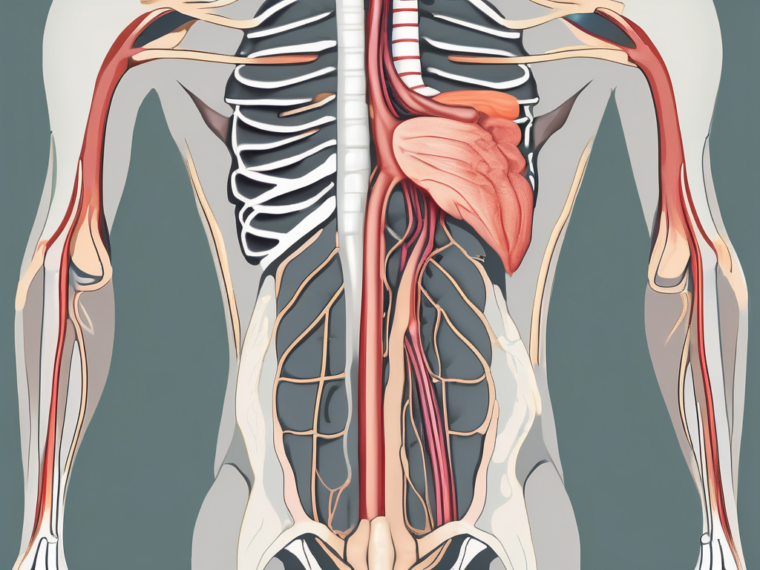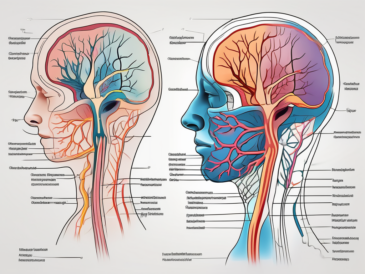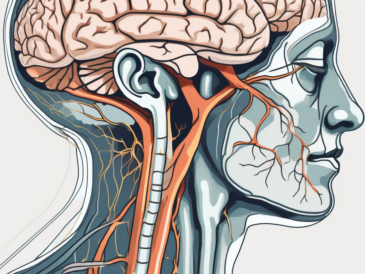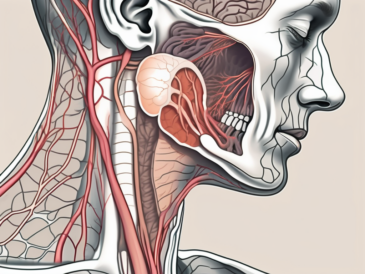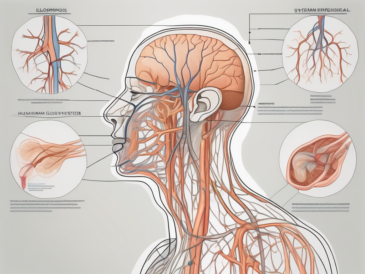The glossopharyngeal nerve, also referred to as the cranial nerve IX, is a crucial component of the human nervous system. It is responsible for transmitting sensory and motor signals between the brain and various parts of the head and neck region. When this nerve sustains damage, it can have significant impacts on the surrounding muscles and their functionality.
Understanding the Glossopharyngeal Nerve
Before delving into the consequences of glossopharyngeal nerve damage, it is essential to comprehend the anatomy and functions of this vital nerve.
The glossopharyngeal nerve, also known as cranial nerve IX, is one of the twelve cranial nerves in the human body. It originates in the medulla oblongata, which is the lower part of the brainstem. The nerve consists of both motor and sensory fibers, providing innervation to specific muscles and structures in the head and neck.
Anatomy of the Glossopharyngeal Nerve
The motor fibers of the glossopharyngeal nerve control the stylopharyngeus muscle, an important muscle involved in swallowing and speech. This muscle helps in elevating the pharynx and larynx during swallowing, allowing the passage of food and liquids into the esophagus.
On the other hand, the sensory fibers of the glossopharyngeal nerve transmit sensations from the tongue, throat, tonsils, and the inner lining of the ear. These sensory signals play a crucial role in our ability to taste, swallow, and perceive sounds.
The glossopharyngeal nerve also carries parasympathetic fibers, which are responsible for regulating the function of certain organs. These fibers control the salivary glands, helping in the production and secretion of saliva, which aids in the digestion of food.
Functions of the Glossopharyngeal Nerve
The glossopharyngeal nerve serves several critical functions in the human body. It plays a significant role in the process of swallowing, as it helps in coordinating the movement of the muscles involved. Without the proper functioning of this nerve, swallowing can become difficult and may lead to complications such as choking or aspiration.
Additionally, this nerve is responsible for transmitting taste sensations from the back of the tongue to the brain, contributing to our ability to appreciate flavors. The taste buds located on the posterior third of the tongue rely on the glossopharyngeal nerve to send signals to the brain, allowing us to distinguish between different tastes, such as sweet, sour, salty, and bitter.
Furthermore, the glossopharyngeal nerve is also involved in regulating blood pressure, heart rate, and monitoring blood oxygen levels. It carries sensory information from specialized receptors called baroreceptors, which detect changes in blood pressure, and chemoreceptors, which monitor the levels of oxygen and carbon dioxide in the blood. This information is relayed to the brain, which then initiates appropriate responses to maintain cardiovascular homeostasis.
In summary, the glossopharyngeal nerve is a complex cranial nerve with diverse functions. Its motor and sensory fibers contribute to the coordination of swallowing, taste perception, and the regulation of cardiovascular parameters. Understanding the anatomy and functions of this nerve is crucial in recognizing the potential consequences of damage or dysfunction, which can have a significant impact on an individual’s quality of life.
Causes and Symptoms of Glossopharyngeal Nerve Damage
Glossopharyngeal nerve damage can occur due to various reasons, and it is essential to identify the common causes and recognize the associated symptoms.
The glossopharyngeal nerve, also known as the ninth cranial nerve, is responsible for transmitting sensory and motor signals between the brain and the throat, tongue, and other structures in the head and neck region. When this nerve gets damaged, it can lead to a range of symptoms and complications.
Common Causes of Damage
Glossopharyngeal nerve damage can be caused by trauma, such as head or neck injuries, which may result in compression or stretching of the nerve fibers. These injuries can occur due to accidents, falls, or sports-related incidents. It is crucial to seek immediate medical attention if you have experienced any trauma to the head or neck to prevent further damage to the glossopharyngeal nerve.
In some cases, infections, such as abscesses or tumors in the throat, can also affect the glossopharyngeal nerve. These infections can cause inflammation and compression of the nerve, leading to various symptoms. Prompt diagnosis and treatment of these infections are necessary to prevent complications and minimize nerve damage.
Additionally, certain medical conditions, including diabetes and multiple sclerosis, can contribute to nerve damage. Diabetes, a chronic condition characterized by high blood sugar levels, can cause damage to the nerves over time. Multiple sclerosis, an autoimmune disease that affects the central nervous system, can lead to inflammation and damage to the glossopharyngeal nerve.
Identifying Symptoms and Signs
The symptoms of glossopharyngeal nerve damage can vary depending on the extent and location of the injury. Common signs include difficulty in swallowing, a feeling of a lump in the throat, and persistent pain in the throat and ear. These symptoms can significantly impact a person’s ability to eat, speak, and perform daily activities.
Some individuals may also experience changes in taste, such as a loss of taste or an altered perception of flavors. This can affect their enjoyment of food and beverages and may lead to a decreased appetite or nutritional deficiencies.
Moreover, glossopharyngeal nerve damage can lead to increased heart rate, low blood pressure, and problems with breathing and speaking. The glossopharyngeal nerve plays a crucial role in regulating heart rate and blood pressure. When damaged, it can disrupt these functions, leading to abnormal heart rhythms and fluctuations in blood pressure.
In severe cases, glossopharyngeal nerve damage can result in difficulty breathing and speaking. The nerve is responsible for controlling the muscles involved in these processes, and any disruption can lead to respiratory and speech problems.
It is important to consult a healthcare professional if you experience any of these symptoms or suspect glossopharyngeal nerve damage. Early diagnosis and appropriate treatment can help manage the symptoms, prevent further complications, and improve overall quality of life.
Muscles Impacted by Glossopharyngeal Nerve Damage
Damage to the glossopharyngeal nerve can have profound consequences on the muscles it innervates, particularly the stylopharyngeus muscle.
Role of Glossopharyngeal Nerve in Muscle Control
The glossopharyngeal nerve controls the stylopharyngeus muscle, which plays a crucial role in the process of swallowing. This muscle helps elevate and widen the pharynx, facilitating the passage of food and liquid from the mouth to the esophagus. It also contributes to the opening of the upper part of the esophagus during swallowing. Therefore, any damage to the glossopharyngeal nerve can result in difficulties and abnormalities in the swallowing process.
When the glossopharyngeal nerve is functioning properly, it sends signals to the stylopharyngeus muscle, instructing it to contract and perform its necessary actions. This coordination allows for the smooth and efficient movement of food and liquid through the throat and into the digestive system. However, when the glossopharyngeal nerve is damaged, these signals may be disrupted or completely blocked, leading to a range of complications.
One of the primary consequences of glossopharyngeal nerve damage is the weakening or paralysis of the stylopharyngeus muscle. This can result in a condition known as dysphagia, which is characterized by difficulties in swallowing. Individuals with glossopharyngeal nerve damage may experience pain, discomfort, and a sensation of food getting stuck in their throat. They may also have trouble initiating swallowing and may cough or choke while eating or drinking.
Specific Muscles Affected
In addition to the stylopharyngeus muscle, glossopharyngeal nerve damage can also impact other muscles involved in the complex task of swallowing, such as the muscles of the soft palate and the pharynx. Dysfunction of these muscles can lead to problems in speech and swallowing, causing significant challenges and discomfort in daily life.
The muscles of the soft palate, including the palatoglossus and palatopharyngeus, are responsible for closing off the nasal cavity during swallowing to prevent food and liquid from entering the nose. Damage to the glossopharyngeal nerve can weaken these muscles, leading to a condition called velopharyngeal insufficiency. This can result in nasal regurgitation, where food or liquid escapes into the nasal cavity instead of going down the esophagus.
The pharyngeal muscles, including the superior, middle, and inferior constrictor muscles, play a crucial role in the contraction and relaxation of the pharynx during swallowing. These muscles work in coordination with the stylopharyngeus muscle to propel food and liquid through the throat. When the glossopharyngeal nerve is damaged, these muscles may not receive the necessary signals to contract, leading to difficulties in swallowing and a sensation of food getting stuck in the throat.
Furthermore, glossopharyngeal nerve damage can also affect the sensory function of the tongue and throat. The glossopharyngeal nerve carries sensory information from the back of the tongue, tonsils, and throat to the brain. Damage to this nerve can result in a loss of taste sensation, a decreased gag reflex, and a reduced ability to perceive touch, temperature, and pain in the affected areas.
In conclusion, damage to the glossopharyngeal nerve can have far-reaching effects on the muscles it innervates, particularly those involved in swallowing and speech. The stylopharyngeus muscle, as well as the muscles of the soft palate and pharynx, can be significantly impacted, leading to difficulties in swallowing, speech abnormalities, and sensory impairments. Proper diagnosis and management of glossopharyngeal nerve damage are essential to alleviate symptoms and improve the quality of life for individuals affected by this condition.
Diagnosis and Treatment of Glossopharyngeal Nerve Damage
Diagnosis of glossopharyngeal nerve damage involves a comprehensive evaluation by a healthcare professional specializing in neurology or otolaryngology. It usually includes a detailed medical history, physical examination, and potentially additional diagnostic tests.
During the medical history evaluation, the healthcare professional will inquire about the patient’s symptoms, their onset, and any potential triggers or underlying medical conditions. They will also ask about any recent injuries or surgeries that may have affected the glossopharyngeal nerve. This thorough assessment helps the healthcare professional gather important information to guide the diagnostic process.
Following the medical history, a physical examination is conducted to assess the patient’s overall health and to specifically evaluate the structures and functions associated with the glossopharyngeal nerve. The healthcare professional may perform tests to assess the patient’s ability to swallow, speak, and sense taste in the back of the throat. They may also examine the patient’s tongue and throat for any visible abnormalities or signs of inflammation.
Diagnostic Procedures
During the evaluation process, the healthcare professional may perform specific tests to assess the cranial nerves and related muscle function. These tests can include imaging studies, such as magnetic resonance imaging (MRI), to identify any structural abnormalities or compression on the glossopharyngeal nerve. This non-invasive procedure allows for detailed visualization of the nerve and surrounding structures, aiding in the diagnosis of nerve damage.
In addition to imaging studies, electromyography (EMG) may be employed to evaluate the electrical activity and function of the affected muscles. This test involves the insertion of small electrodes into the muscles surrounding the glossopharyngeal nerve. By measuring the electrical signals produced by the muscles, the healthcare professional can assess the integrity and functionality of the nerve.
Furthermore, a swallow study may be conducted to evaluate the patient’s ability to swallow safely and effectively. This test involves the patient consuming various food and liquid consistencies while being monitored by a healthcare professional. The study helps identify any difficulties or abnormalities in the swallowing process that may be attributed to glossopharyngeal nerve damage.
Treatment Options and Rehabilitation
The treatment of glossopharyngeal nerve damage depends on the underlying cause and the severity of the condition. In some cases, conservative management, such as pain medications and physical therapy, may be recommended to alleviate symptoms and improve muscle function.
Physical therapy can play a crucial role in the rehabilitation process by focusing on exercises that target the muscles associated with swallowing and speech. These exercises aim to strengthen the affected muscles and improve their coordination, ultimately enhancing the patient’s ability to swallow and communicate effectively.
However, if the damage to the glossopharyngeal nerve is severe or persistent, surgical intervention may be necessary. Nerve decompression or repair procedures can be performed to alleviate any compression or damage to the nerve. These surgical techniques aim to restore the normal function of the glossopharyngeal nerve and improve the patient’s quality of life.
It is crucial for individuals with glossopharyngeal nerve damage to consult with a healthcare professional to determine the most appropriate treatment options for their specific case. The healthcare professional will consider factors such as the underlying cause, the severity of the damage, and the overall health of the patient when developing a personalized treatment plan.
Living with Glossopharyngeal Nerve Damage
Coping with glossopharyngeal nerve damage can be challenging, but there are strategies and resources available to help manage the associated symptoms.
Glossopharyngeal nerve damage occurs when the glossopharyngeal nerve, which is responsible for controlling various muscles in the head and neck region, is injured or impaired. This can lead to difficulties in speech, swallowing, and even breathing. The impact of glossopharyngeal nerve damage can vary from person to person, with some experiencing mild symptoms while others may face more severe limitations in their daily lives.
Managing Symptoms in Daily Life
Individuals with glossopharyngeal nerve damage can benefit from adopting certain lifestyle modifications to improve their quality of life. These can include dietary adjustments, such as consuming softer foods and ensuring adequate hydration. Eating softer foods can help reduce the risk of choking and make swallowing easier. Additionally, staying hydrated is important to maintain overall health and prevent dryness in the throat, which can exacerbate symptoms.
Speech therapy may also be beneficial in overcoming difficulties in speech and swallowing. A speech therapist can provide exercises and techniques to improve muscle control and coordination, allowing individuals to communicate more effectively and safely consume food and liquids. These therapy sessions can be tailored to the specific needs and abilities of each individual, helping them regain confidence and independence in their daily lives.
Furthermore, engaging in relaxation techniques and stress management practices can assist in coping with any associated discomfort or pain. Chronic pain and discomfort are common symptoms of glossopharyngeal nerve damage, and finding ways to manage and reduce these sensations can greatly improve one’s overall well-being. Techniques such as deep breathing exercises, meditation, and gentle stretching can help relax the muscles and alleviate tension, providing relief from pain and promoting a sense of calm.
Support and Resources for Patients
Living with glossopharyngeal nerve damage can be emotionally and physically demanding. Therefore, it is essential for individuals to seek support from healthcare professionals, support groups, and online resources. These avenues can provide valuable information, guidance, and a sense of community, helping individuals navigate the challenges associated with glossopharyngeal nerve damage.
Healthcare professionals, such as neurologists, otolaryngologists, and speech therapists, can offer specialized care and treatment options tailored to the individual’s specific needs. They can assess the extent of the nerve damage, provide appropriate medical interventions, and monitor progress over time. Support groups, both in-person and online, can connect individuals with others who are facing similar challenges, providing a safe space to share experiences, exchange advice, and offer emotional support.
Online resources, such as websites and forums dedicated to glossopharyngeal nerve damage, can also be valuable sources of information and support. These platforms often provide educational materials, expert advice, and stories from individuals who have successfully managed their symptoms. Reading about others’ experiences and learning about different coping strategies can empower individuals to take an active role in their own care and make informed decisions about their treatment options.
In conclusion, glossopharyngeal nerve damage can have far-reaching impacts on various muscles in the head and neck region. Understanding the anatomy, functions, and potential consequences of glossopharyngeal nerve damage is essential in managing the associated symptoms and seeking appropriate medical attention. If you suspect glossopharyngeal nerve damage, consult with a healthcare professional to receive a thorough evaluation and personalized guidance for your specific situation.
